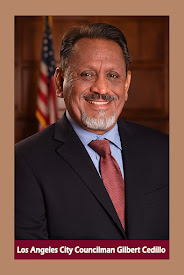TAMALES DE PUERCO
By Abel Salas
Written by Mercedes Floresislas and directed by Edward Padilla, Tamales de Puerco is a taut, emotionally driven examination of volatile community issues. That it also celebrates the resiliency of the human spirit with healthy doses of love, joy and humor makes it a near perfect production. At the center of what is essentially a good vs. evil drama, a beautiful, resolute young mother of a deaf child stands up against an abusive husband, takes on a society that rejects and persecutes her as an undocumented immigrant and overcomes the difficulties faced by the community of hearing impaired Latinos.
A challenge to stage because it is transpires in American Sign Language, English and Spanish, the tri-lingual play could have just as easily devolved into a logistical nightmare. All three languages are used interchangeably and often at the same time by any number of characters in every scene. Still, the play presents an uncompromising look at little known, easily ignored realities that occur around us every day, realities that are no less important and just as imbued with tragic life-and-death consequences as any to be found in literature, film or television. Floresislas is to be lauded for her ground-breaking attempt to convey a vivid sense of what life in her shoes as the single mother of a deaf child—who went undiagnosed until two years after his birth—has been like.
Featuring both deaf and non-deaf actors, the cast bristles with nuanced talent. Each singular voice, whether spoken aloud or signed (super titles translate all three languages) provides a visceral component to create a superb ensemble piece that echoes with all the power, pain and victory of an epic drama. In an early scene, deaf actor Dickie Hearts, tells the story of an unfulfilled relationship with his hearing father. They were reunited, he reveals at an A.A. meeting for the deaf, in the hospital, where his father lay dying, using his last ounce of energy to make the signs that would communicate to his son how much he loved him and how proud he was of him. Hearts is riveting, and the raw emotion he is channels with his hands and body hovers over the stage with a palpable weight.
Crystal González, as Norma Morales, is at the center of the play and carries much of its dramatic intensity on her beleaguered but proud shoulders. Norma's legal status forces her to make her own opportunities by participating in the underground economy as a street vendor. Los Angeles is the only city among 10 largest in the U.S. that criminalizes street or sidewalk vending of any kind. In addition to the precarious nature of her situation, Norma must also learn to let go of her bright son Mauricio as he advances quickly in the deaf world and learns to communicate at a speed and with a vocabulary that outstrip her own.
Alternately played by Jaden Delgado and Olin Tonatiuh, two precocious actors, aged 7 and 9 respectively, who learned ASL as they were rehearsing the play, Mauricio is the reason Norma struggles so valiantly. Both equally gifted and poised, Delgado and Tonatiuh take to the stage naturally, making Mauricio seem so real, it comes as a surprise to learn they are not, in truth, deaf actors.
Comic foil Miriam Peniche brings her years of professional experience and impeccable timing to the production as Tana, the elotera who nearly steals the show with tongue-in-cheek one liners, or albures, the Spanish-language equivalent of the double entendre. An innocent word or phrase on her tongue has untold layers of meaning, each one more colorful and adult than the other. Peniche's shear physicality and brute force vibrate with control and focus. Watching her work is akin to witnessing a surgeon at the operating table. Fortunately for us it is a contagious finesse. It rubs off on her cohorts, both hearing and deaf.
Lynn Moran as Karla and Scott McMaster as her hearing husband Cesar deserve mention here as well. While their storyline is secondary, it is brilliantly elucidated with acting prowess and a searing tenderness. Moran, a deaf actor, brings depth and sincerity to the role of the young professional woman who becomes attached to Mauricio and must come to terms with her own maternal longings, painful memories and abandonment issues. McMaster, like González, signs while speaking. Both, even when "speaking" two languages at once, deliver seamless performances that complement the actors who don't hear in the traditional sense, but feel everything nonetheless with all the breathtaking urgency that informs the play.
With a superbly crafted and mobile set designed by Marco de Leon and sound design by pianist-composer Geoffrey Aymar, Tamales de Puerco is a worthy, rewarding drama that "speaks" to relevant community issues even as it highlights the Deaf Latino experience, an American experience that until now, has not seen the light of day. Together, Padilla and playwright Floresislas have proven that good, gutsy, professional theater is alive and well on the East Side.
Written by Mercedes Floresislas and directed by Edward Padilla, Tamales de Puerco is a taut, emotionally driven examination of volatile community issues. That it also celebrates the resiliency of the human spirit with healthy doses of love, joy and humor makes it a near perfect production. At the center of what is essentially a good vs. evil drama, a beautiful, resolute young mother of a deaf child stands up against an abusive husband, takes on a society that rejects and persecutes her as an undocumented immigrant and overcomes the difficulties faced by the community of hearing impaired Latinos.
Written as part of a Boyle Heights writing workshop led by Josefina López, the play was originally staged by CASA 0101 in 2008. For the current production, the script has been revisited with more attention to characterization. Things that worked well in the first incarnation have been kept and some of the clunky dialogue present in the early version has been streamlined. While the writing resorts more than it should to the obvious laugh and lingers occasionally on heavy-handed literal explanations, its deficiencies disappear under the adroit direction of Edward Padilla.
A challenge to stage because it is transpires in American Sign Language, English and Spanish, the tri-lingual play could have just as easily devolved into a logistical nightmare. All three languages are used interchangeably and often at the same time by any number of characters in every scene. Still, the play presents an uncompromising look at little known, easily ignored realities that occur around us every day, realities that are no less important and just as imbued with tragic life-and-death consequences as any to be found in literature, film or television. Floresislas is to be lauded for her ground-breaking attempt to convey a vivid sense of what life in her shoes as the single mother of a deaf child—who went undiagnosed until two years after his birth—has been like.
Featuring both deaf and non-deaf actors, the cast bristles with nuanced talent. Each singular voice, whether spoken aloud or signed (super titles translate all three languages) provides a visceral component to create a superb ensemble piece that echoes with all the power, pain and victory of an epic drama. In an early scene, deaf actor Dickie Hearts, tells the story of an unfulfilled relationship with his hearing father. They were reunited, he reveals at an A.A. meeting for the deaf, in the hospital, where his father lay dying, using his last ounce of energy to make the signs that would communicate to his son how much he loved him and how proud he was of him. Hearts is riveting, and the raw emotion he is channels with his hands and body hovers over the stage with a palpable weight.
Crystal González, as Norma Morales, is at the center of the play and carries much of its dramatic intensity on her beleaguered but proud shoulders. Norma's legal status forces her to make her own opportunities by participating in the underground economy as a street vendor. Los Angeles is the only city among 10 largest in the U.S. that criminalizes street or sidewalk vending of any kind. In addition to the precarious nature of her situation, Norma must also learn to let go of her bright son Mauricio as he advances quickly in the deaf world and learns to communicate at a speed and with a vocabulary that outstrip her own.
Alternately played by Jaden Delgado and Olin Tonatiuh, two precocious actors, aged 7 and 9 respectively, who learned ASL as they were rehearsing the play, Mauricio is the reason Norma struggles so valiantly. Both equally gifted and poised, Delgado and Tonatiuh take to the stage naturally, making Mauricio seem so real, it comes as a surprise to learn they are not, in truth, deaf actors.
Comic foil Miriam Peniche brings her years of professional experience and impeccable timing to the production as Tana, the elotera who nearly steals the show with tongue-in-cheek one liners, or albures, the Spanish-language equivalent of the double entendre. An innocent word or phrase on her tongue has untold layers of meaning, each one more colorful and adult than the other. Peniche's shear physicality and brute force vibrate with control and focus. Watching her work is akin to witnessing a surgeon at the operating table. Fortunately for us it is a contagious finesse. It rubs off on her cohorts, both hearing and deaf.
Lynn Moran as Karla and Scott McMaster as her hearing husband Cesar deserve mention here as well. While their storyline is secondary, it is brilliantly elucidated with acting prowess and a searing tenderness. Moran, a deaf actor, brings depth and sincerity to the role of the young professional woman who becomes attached to Mauricio and must come to terms with her own maternal longings, painful memories and abandonment issues. McMaster, like González, signs while speaking. Both, even when "speaking" two languages at once, deliver seamless performances that complement the actors who don't hear in the traditional sense, but feel everything nonetheless with all the breathtaking urgency that informs the play.
With a superbly crafted and mobile set designed by Marco de Leon and sound design by pianist-composer Geoffrey Aymar, Tamales de Puerco is a worthy, rewarding drama that "speaks" to relevant community issues even as it highlights the Deaf Latino experience, an American experience that until now, has not seen the light of day. Together, Padilla and playwright Floresislas have proven that good, gutsy, professional theater is alive and well on the East Side.





Comments
Post a Comment